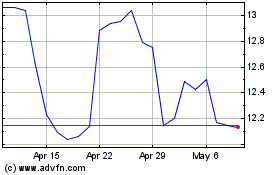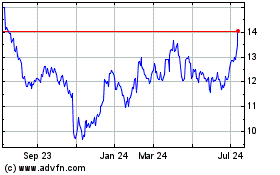By Matt Wirz and John D. Stoll
This article is being republished as part of our daily
reproduction of WSJ.com articles that also appeared in the U.S.
print edition of The Wall Street Journal (August 8, 2017).
Tesla Inc. took a step toward financing its transformation from
a niche builder of pricey luxury cars to a mass-market rival of
Fords and Chevrolets, setting plans to raise $1.5 billion in its
first-ever sale of traditional bonds.
The electric-car maker, gearing up for an ambitious expansion
with the introduction of its more moderately priced Model 3 sedan,
is expected to sell the bonds as early as Friday in a deal
underwritten by Goldman Sachs Group Inc.
The Palo Alto, Calif., company said on Monday that the funds
would help push broader sales of its lower-price Model 3 sedan,
which the company plans to use to steal a march on mass market
rivals such as Ford Motor Co.
Tesla has been a big winner in the stock market -- up more than
1,000% in the past five years to a recent market value of $59
billion -- and investors said they expect the firm's efforts to
sell junk bonds to succeed, given the market's thirst for
high-yield debt.
At the same time, the auto industry is among the most
capital-intensive ventures in business. Tesla posted a loss of $336
million in its most recent quarter despite rising revenue,
highlighting the firm's dependence on raising capital in the
financial markets. Tesla is the most valuable U.S. auto maker, but
it sells a fraction of the vehicles sold by General Motors Co.,
Ford or Fiat Chrysler Automobiles NV -- and has yet to report an
annual profit after nearly 15 years in business.
Tesla "burns a lot of cash and it's not clear they have a
sustainable business," said Bob Schwartz, a bond analyst for
AllianceBernstein LP who is debating whether to buy the new debt.
The deal is likely to get strong support from investment firms that
already own Tesla stock, but "just because it has a huge market cap
doesn't mean it's a good credit," he said.
Tesla is rated B-minus by S&P Global, seven notches below
the firm's rating of Ford.
Turning to the bond market allows Tesla Chief Executive Elon
Musk to raise money without diluting his ownership or further
encumbering corporate assets.
Tesla tapped Goldman to arrange the issue of an eight-year, $1.5
billion bond, and the investment bank is unofficially marketing it
to yield 5.25%, a person familiar with the matter said. Goldman is
offering prospective investors a tour of the company's factory on
Wednesday to introduce them to the firm, according to an
investor.
The sale comes after Tesla repeatedly sold stock and convertible
bonds, which can be exchanged for equity later, raising almost $8.5
billion in such deals since 2010, according to Dealogic. The firm
also started borrowing against its hard assets in the
corporate-loan market in 2015 and has since issued $4.5 billion in
loans.
The business case for electric cars remains murky. Gasoline is
cheap, driving people to pickups and sport-utility vehicles powered
by internal combustion engines, and battery-powered cars are seen
as taking too long to charge, expensive and lacking range. Tesla's
cars, to date, have qualified for a $7,500 federal tax credit and
Tesla has spent heavily to place so-called fast chargers all over
the world.
Recently, Tesla's Mr. Musk promised to add electric pickup
trucks, small SUVs, large trucks and bus-like vehicles. Analysts
expect the future ambitions of Tesla, which is already committing a
substantial chunk of the company's revenue to capital expenditures
and R&D, to require additional capital increases.
The Model 3 is aimed at more mainstream buyers, with a base
price of $35,000. Critics say that car can't be plagued with the
same quality glitches that Model S or X buyers experienced, and
that wait times for service or delivery need to be curtailed.
Selling hundreds of thousands of Model 3s is seen as necessary
because it could bring battery costs closer in line with
conventional engines.
An electric car can cost upward of $10,000 more than its
conventional counterpart, and analysts say it could take nearly a
decade to close the gap. Tesla, building its own batteries, could
have disproportionate influence in bringing those costs down due to
its deep experience, access to technical experts and considerable
scale.
A year ago, Mr. Musk combined Tesla with SolarCity, a home-solar
company that he served as chairman of at the time. Combining the
two companies was designed to make Tesla a more diverse company
focused on batteries, solar energy and automobiles. Other auto
makers have scaled back on alternative business lines.
Mr. Musk runs several ventures outside of the car business,
including Space Exploration Technologies Corp. He is a major backer
of those companies, with shares in some being used as collateral
for personal loans used to buy even more stock in the companies he
runs.
Bond investors are eager for new deals because there has been
little supply in recent months due to a slowdown in mergers and
acquisitions, which are usually funded with junk bonds. High-yield
companies issued $9 billion of new bonds in July, the lowest amount
since January 2016, according to Dealogic, when collapsing oil
prices caused junk-debt markets to shut down.
"There hasn't been much new supply and investors have cash they
need to spend," said Tom O'Reilly, head of non-investment-grade
credit for Neuberger Berman Group LLC, who says he won't
participate in the sale. "As a new borrower, that's going to play
to your advantage."
The bond sale also comes during a summer slowdown in
corporate-debt offerings, which some fund managers said could
produce favorable terms for Tesla among investors hungry for new
bonds. Yet several prospective buyers said they remain leery of
lending to a company that has yet to report an annual profit and
has one of the lowest-possible credit ratings.
Write to Matt Wirz at matthieu.wirz@wsj.com and John D. Stoll at
john.stoll@wsj.com
(END) Dow Jones Newswires
August 08, 2017 02:47 ET (06:47 GMT)
Copyright (c) 2017 Dow Jones & Company, Inc.
Ford Motor (NYSE:F)
Historical Stock Chart
From Mar 2024 to Apr 2024

Ford Motor (NYSE:F)
Historical Stock Chart
From Apr 2023 to Apr 2024
